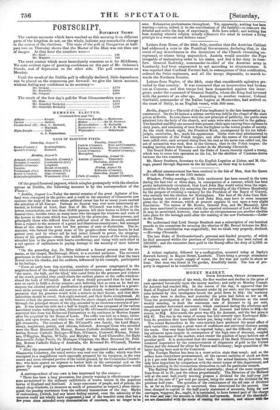Letters from Rome, of the 28th July, mention that the
Austrian Cabinet had addressed a note to the Pontifical Government, declaring that, in the event of any disturbances in the dominions of the Church remaining un- repressed, or crimes being unpunished, Austria would consider the Pope incapable of maintaining order in his states, and feel it her duty to inter- fere. General Radetsky, commander-in-chief of the Austrian army in Lombardy, had been empowered to act according to circumstances. It was reported that Cardinal Ferretti had, in consequence of that notification, ordered the Swiss regiments, and all the troops disposable, to march to- wards the Northern frontier.
Letters from Naples, of the 28th, state that considerable agitation pre- vailed in that country. It was rumoured that an insurrection had broken out at Cosenza; and that troops had been despatched against the insur- gents, under the command of General Statella, whom the King had invested with the powers of an alter ego. According to another rumour, Colonel Garibaldi, commander of the Italian Legion at Montevideo, had arrived on the coast of Sicily, in an English vessel, with 300 men.
Berlin, August 2.—The trial of the Poles implicated in the late insurrection ha commenced. On the 2d instant a solemn service was held in the chapel of the state prison at Berlin. In compliance with the new principle of publicity, the public were admitted into the body of the church, and seats were also reserved in the gallery. Two hundred and fifty-one accused were present; their ages varying from eighteen to sixty years, and consisting of men from the highest to the lowest grades of society. As the clock struck eight, the President Koch, accompanied by his ten fellow- judges' secretaries, &c., made his appearance. Oaths were then administered to two interpreters of the Polish tongue; and after the names of the accused had been called over, each accused rising from his seat as his name was called oat, the act of accusation was read, first in the German, then in the Polish tongue: the reading lasting above four hours.—Letter in the Morning Chronicle.
The Grand Duke of Tuscany and the Duke of Lucca recently signed a treaty, which was to come into operation on the 1st, for the abolition of Customs-duties between the two countries.
Mr. Henry Southern, Secretary to the English Legation at Lisbon, and M. Olo- zaga, passed through Bayonne on the 2d instant, on their way to London.


























 Previous page
Previous page